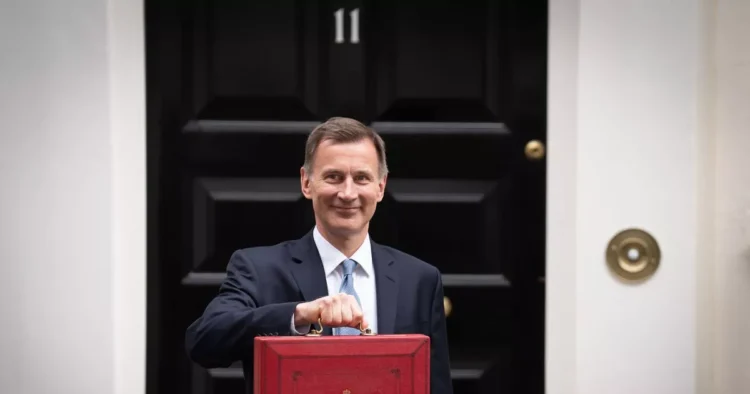By Ben Kerrigan-
UK Chancellor, Jeremy Hunt, (pictured)has outlined the UK’s economic trajectory, addressing the multifaceted challenges posed by the financial crisis, the COVID-19 pandemic, and the energy crisis precipitated by the conflict in Europe.
The chancellor opened the 2024 Budget amid noisy scenes in the Commons.
Jeremy Hunt told MPs the UK has seen higher growth since 2010 under the Conservatives than every large European economy and proceeded to offer “permanent cuts in taxation”.
In a strategic move aimed at balancing economic stability with political positioning in an election year, Hunt declared a budget geared towards fostering long-term growth while providing immediate relief to households.
Acknowledging the persistence of high interest rates amidst efforts to curb inflation, Hunt affirmed the government’s commitment to easing the burden on families, not only through cost-of-living support but also through permanent tax cuts.
Emphasizing the overarching theme of the budget as a catalyst for sustained economic expansion, he laid out a series of measures encompassing tax reforms, public spending, and strategic investments.
Hunt also announced a six-month extension to the Household Support Fund, a freeze in alcohol duty, and an extension to the 5p cut in fuel duty.
He said he was increasing the VAT threshold for small businesses to £90,000, and announces new taxes on vapes and higher taxes for business class flights
Political Overtones and Policy Highlights
Hunt’s budget address did not shy away from its political undercurrents, as he launched into a pointed critique of Labour’s spending plans before detailing his own proposals.
The national insurance contribution rate reduction, slated to drop from 10% to 8% of pay in April, was reaffirmed, building upon the 2p cut announced in the autumn statement.
While touted as a move to ease financial burdens, its efficacy in swaying public opinion remains a point of contention, particularly given its prior negligible impact on polling figures.
In a significant move aimed at reshaping tax fairness, the abolition of the non-domiciled tax status was announced, set to be replaced by a simplified system from April 2025.
This change, albeit politically charged, expresses the government’s strategic maneuvering to preempt opposition critiques, especially concerning fiscal plans outlined by rivals.
Tax Reforms and Sector-Specific Initiatives
The budget unveiled several tax adjustments, including a reduction in the higher rate of property capital gains tax and the abolition of stamp duty relief for multiple dwelling purchases.
Additionally, measures targeting holiday lets and vaping products were introduced, reflecting the government’s efforts to align fiscal policies with societal concerns while bolstering revenue streams.
Strategic allocations were made to bolster key sectors, with significant investments earmarked for the NHS, infrastructure development, and green technologies.
Notable among these allocations is the infusion of funds into nuclear energy projects and AstraZeneca’s commitment to expanding its presence in the UK, signaling a concerted push towards sustainability and innovation.
Hunt’s budget projections reveal a cautious optimism, with inflation anticipated to dip below the government’s 2% target sooner than previously forecasted.
Leveraging this economic trajectory, Hunt outlined a trajectory of declining borrowing and debt, positioning the UK favorably compared to its G7 counterparts.
Furthermore, initiatives aimed at bolstering productivity and fostering innovation in public services reflect a forward-looking approach to economic governance.
Chancellor Jeremy Hunt’s budget presentation represents a delicate balancing act, navigating the intricacies of economic recovery while positioning the government favorably in the lead-up to elections.
With a mix of tax reforms, strategic investments, and fiscal projections, the budget outlines a roadmap for sustained growth while addressing immediate concerns of households and businesses.
However, the efficacy of these measures in navigating the complexities of a post-pandemic landscape and geopolitical uncertainties are yet to be seen , given the challenges inherent in economic governance amidst evolving global dynamics.




